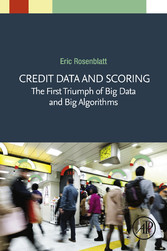Suchen und Finden
Service

Credit Data and Scoring - The First Triumph of Big Data and Big Algorithms
Eric Rosenblatt
Verlag Elsevier Reference Monographs, 2020
ISBN 9780128188163 , 274 Seiten
Format PDF, ePUB
Kopierschutz DRM
Geräte
Credit Data and Scoring: The First Triumph of Big Data and Big Algorithms illuminates the often-hidden practice of predicting an individual's economic responsibility. Written by a leading practitioner, it examines the international implications of US leadership in credit scoring and what other countries have learned from it in building their own systems. Through its comprehensive contemporary perspective, the book also explores how algorithms and big data are driving the future of credit scoring. By revealing a new big picture and data comparisons, it delivers useful insights into legal, regulatory and data manipulation.
- Provides insights into credit scoring goals and methods
- Examines U.S leadership in developing credit data and algorithms and how other countries depart from it
- Analyzes the growing influence of algorithms in data scoring
Eric Rosenblatt has worked in the mortgage industry, mainly the credit side, for thirty years, most of it (since 2000) as a Vice President at Fannie Mae. He received a Ph.D. in Finance in 1994. At Fannie Mae he was known for his management of Credit Risk analytics (including credit report models), his correct call of the housing recession, and for what Fannie called Innovation: applications and models which integrated data and made credit, fraud, and home valuation decisions. One of these applications, Collateral Underwriter, is used by all lenders and appraisal management companies. Another is a credit scoring model that treats people that pay their credit card balances (transactors) differently than people that do not (revolvers). While at Fannie Mae he published 19 papers and was granted 13 patents.
Shop


